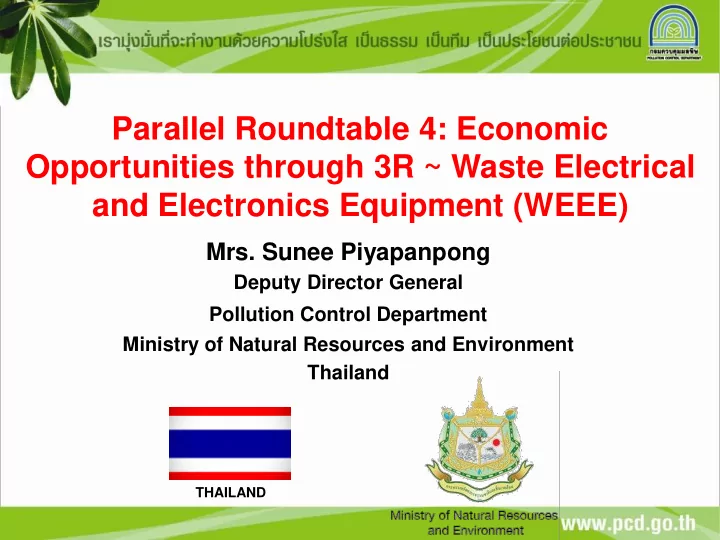

Parallel Roundtable 4: Economic Opportunities through 3R ~ Waste Electrical and Electronics Equipment (WEEE) Mrs. Sunee Piyapanpong Deputy Director General Pollution Control Department Ministry of Natural Resources and Environment Thailand THAILAND
Outline WEEE situation Thailand WEEE Policy and Legislation E-waste Management : Trend and Opportunity
Estimation of WEEE Generation 14,000 Mobile phone/Land line Waste Generation (x1000 unit) 12,000 Media player TV 10,000 PC Fan 8,000 Printer 6,000 Digital camera/ VDO camcorder Refrigerator 4,000 A/C Washing Machine 2,000 Microwave 0 2014 2015 2016 2017 2018 2019 2020 2021 Year Ref: PCD, 2012
Pathway of WEEE Donate/ Give away 7.84% Keep at home Sell 25.32% 51.27% Throw away 15.60% PCD (2012)
Management Problems 1. Lack of WEEE laws and regulations No specific laws and regulations Lack of enforcement 2. Lack of awareness/knowledge No waste segregation/mixed waste Keeping e-waste at home/office – loss of recycling opportunity 5
Management Problems ( cont’d) 3. Lack of supporting mechanism/ environmentally sound infrastructure Only few environmentally sound recycling facilities Ref: Carbon Reduction Centrally distributed location of waste Technologies processors Lack of good collection practice 4. Illegal import presumed to be some source of e-waste for non-environmentally sound recycling and disposal facilities
Management Problems ( cont’d) 5. Existing and active “informal sector” A lot of junk shops across the country Non-environmentally sound recycling Lack of pollution control/ environmental protection measures Residues from recycling and non-valuable components/parts are discarded with municipal solid waste
Thailand WEEE Policy and Legislation
National Integrated WEEE Management Strategy Strategy (2014-2021) Preventive measures 1. Strengthening of import/export control Implementation of 2. Promotion of eco-friendly e-products with Extended Producer the focus on public procurement Responsibility (EPR) 3. Development of WEEE database Use of economic 4. Development of WEEE segregation, instruments in the collection, storage and transport for local WEEE management government Prepare all 5. Upgrade of dismantling and recycling facility stakeholders for 6. Promotion of public awareness on WEEE WEEE law
Draft Act on the Management of WEEE, B.E. …. Specific law on WEEE management based on Extended Producer Responsibility (EPR) principles Producer/Importers • Provide take-back and collection channels • Register and submit in compliance with National WEEE management plan Consumer • Return e-waste to the distributor, take-back center or authorized factory • Not allowed to discard end-of-life product in the public place, abandoned site or in MSW stream Take-back Center • refrain from product dismantling, except inspection purposes • send the collected end-of-life products to authorized factory
Proposed Types of WEEE to be Regulated 2. Air Conditioners 1. TV 5. Mobile phone 4. Desktop & Laptop /Land line 3. Refrigerator
E-waste Management : Trend and Opportunity • Increasing of WEEE • Promotion environmental-sound management of E- waste and WEEE for effective recovery, recycling and disposal by the national WEEE plan and WEEE law development • Opportunity to establish WEEE processing and recovery plants in nationwide • Incentives for WEEE business such as BOI, tax incentives for green products and recycling technology
Waste and Hazardous Substance Management Bureau Pollution Control Department Ministry of Natural Resources and Environment THAILAND Tel: +66-02-298-2435 Fax: +66-02-298-2438 E-mail: hazwaste@pcd.go.th
Recommend
More recommend